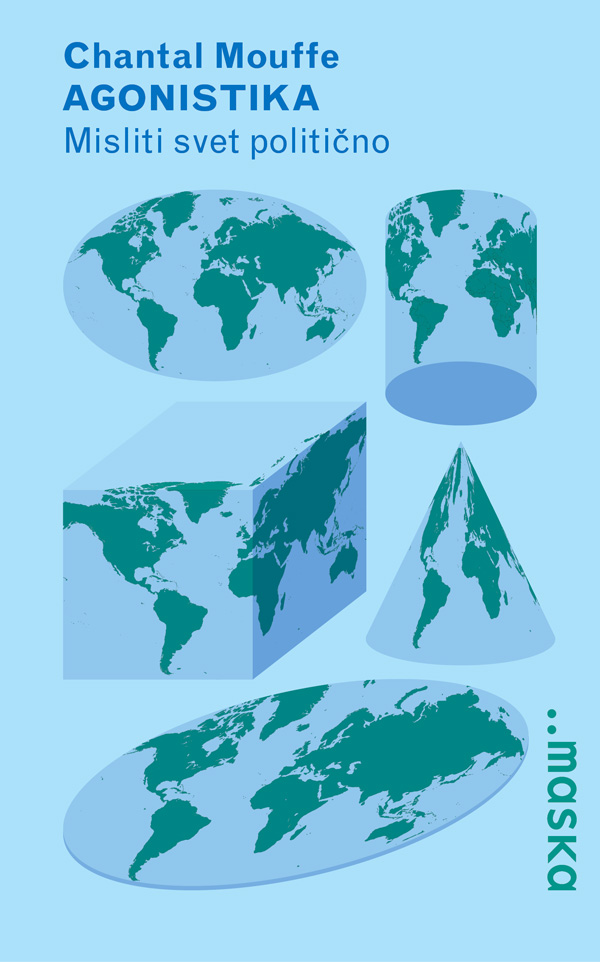Chantal Mouffe: Agonistics. Thinking the World Politically

In Agonistics: Thinking the World Politically, Chantal Mouffe performs a unique stocktaking of the concept of agonistic political theory that she developed for several years and bases on the assumption that political thinking requires a recognition of the ontological dimension to the radical negativity that cannot be dialectically solved, not can a comprehensive objectivity be reached.
In her theory, Mouffe gives the central and affirmative role to conflict that she understands as a precondition for the Other to be included: the key concepts of her political thought remain the “agonistics” and the “hegemony” of radical democracy on the road to ensuring basic human rights, freedom, and equality for all.
In this book, Chantal Mouffe theoretically probes international relations, the strategies of radical politics, the future of Europe, and the politics of artistic practices, and shows how antagonistic politics can show the possibility to change in many situations where alternatives seem impossible. By studying cosmopolitanism, post-operaismo, and various concepts of multitude, Chantal Mouffe stands for a multi-polar world of cultural and political pluralism.
Mediakcije Collection, book no. 14
Original title: Agonistics. Thinking the World Politically
Translation: Aleksandra Rekar
Preface: Peter Klepec
12 × 19cm
© Maska, Ljubljana, 2015
This book was published in Slovenian.
Democracy calls for confrontation
“Za agonistični pogled je središčna kategorija demokratične politike »tekmec«, nekdo, s katerim deliš zvestobo demokratičnim načelom »svobode in enakosti za vse«, medtem ko se na drugi strani ne strinjaš z njihovo razlago. Tekmeca se borita med seboj zato, ker želita, da bi njuna interpretacija načel postala hegemonska, vendar pri tem ne postavljata pod vprašaj legitimnosti nasprotnikove pravice do boja za zmago njegovega načela. Takšno spopadanje tekmecev vzpostavi »agonistični boj«, ki je pogoj za vitalno demokracijo. […] Dobro delujoča demokracija kliče po konfrontaciji demokratičnih političnih stališč. Če tega ni, vselej obstaja nevarnost, da bo demokratični spopad zamenjal spopad nezdružljivih moralnih vrednot ali esencialističnih oblik identifikacij. Prevelik poudarek na konsenzu – skupaj z odporom do spopadov – vodi v apatijo in v nezadovoljstvo s politično participacijo. To je tudi razlog, zakaj liberalnodemokratska družba kliče po razpravi o možnih alternativah.”
(Chantal Mouffe, Agonistics)
Contents
KAJ JE AGONISTIČNA POLITIKA?
Agonistični model
Agonizem in antagonizem
Etika ali politika
KAKŠNO DEMOKRACIJO ZA VEČPOLARNI AGONISTIČNI SVET?
Institucionalni pacifizem Norberta Bobbia
Kakšno demokracijo za večpolarni agonistični svet?
AGONISTIČNI PRISTOP K PRIHODNOSTI EVROPE
Skupinske identitete
Evropska integracija
Evropa narodov ali Evropa regij?
Kakšno demokracijo: posvetovalno ali agonistično?
Evropska alternativa neoliberalizmu
RADIKALNA POLITIKA DANES
Kritika, ki kliče po umiku
Kritika, ki kliče po hegemonskem sodelovanju
Imanentizem proti radikalni negativiteti
Komunizem ali radikalna demokracija?
AGONISTIČNA POLITIKA IN UMETNIŠKE PRAKSE
Agonistični javni prostori
Protihegemonske intervencije Alfreda Jaara
Umetniški aktivizem
Muzeji in institucije
Umetniki kot organski intelektualci
SKLEP
Nov tip aktivizma?
Agonistični pristop
Demokracija ali predstavništvo?
POGOVOR S CHANTAL MOUFFE
DELOVATI, DELOVATI POLITIČNO, ZATO SMO TU!
About the Author

Belgian theoretician Chantal Mouffe is a professor of political sciences at Westminster University, London. She has lectured and researched on numerous universities in Europe, and North and South America; today, she is one of the most prominent names of the neo-Marxist scene in the world. She has edited several resounding books, including Gramsci and Marxist Theory (Routledge and Kegan Paul, 1979), Dimensions of Radical Democracy: Pluralism, Citizenship, Community (Verso, 1992), Deconstruction and Pragmatism (Routledge, 1996) and The Challenge of Carl Schmitt (Verso, 1999). With Argentinian philosopher Ernest Laclau, she wrote Hegemony and Socialist Strategy: Toward A Radical Democratic Politics (Verso, 1985; Slovenian translation: Partizanska knjiga, 1987). She is the author of The Return of the Political (Verso, 1993), The Democratic Paradox (Verso, 2000), On the Political (Routledge, 2005) and Agonistics: Thinking the World Politically (Verso, 2013; Slovenian translation: Maska, 2015).
Reception in public
Jela Krečič: Kako živeti v neharmonični družbi
Delo / 19. 7. 2016
Mouffe does not hold back in her critique of neo-liberalism; she rejects both the politics as an expert activity for certain fields (especially when it comes to economy and the market), as well as the subservience of culture and the creative industries to the dictate of the capital.
Žiga Valetič: Agonistika
Bukla / 13. 6. 2016
In Agonistics, Belgian professor and political theorist Chantal Mouffe cuts in one of the key questions of contemporary democracy – its functionality. /…/ She finds the main mechanism of vital democracy in positive conflict that does not revoke the adversary or the competitor with opposing ideas the legitimacy of the right to fight and win, but challenges and overcomes them with arguments that are increasingly clearer.